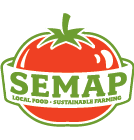There is a boost of energy with the early spring this year and since the soil is already workable farmers are getting an early start to their crops. (This being New England though, we know the weather could turn at any moment.) Farmers are busy planting spinach, radish, beets and peas, and we all are anticipating the first harvest of the season.
While the farmers are occupied with spring planting, Massachusetts state legislators have been busy at the State House compiling a comprehensive Omnibus Ag Bill (S.2171) An Act to promote agriculture in the Commonwealth. The Joint Committee of Environment, Natural Resources and Agriculture, chaired by Senator Anne Gobi and Representative Paul Schmid, filed a bill that supports farmers and local food across the state and to continue the economic growth that agriculture has had in the Commonwealth. It aims to increase the availability of locally grown food, offer opportunities to current and future farmers and invest in agricultural programs to boost the industry. The Omnibus Ag bill consists of almost 20 pieces of legislation, some previously proposed and others new initiatives, and is intended to be a comprehensive approach to agricultural policy in the Commonwealth. Much of legislation came from specific recommendations from the Massachusetts Local Food Action Plan.
Some elements of the bill:
Agricultural Estate Tax (also in HB 3507)
Agricultural land would have the same valuation as 61A (Chapter 61A is the section of State Code that deals with assessment and taxation of agricultural and horticultural lands) for estate tax purposes. Current law says inherited land must be assessed at its “highest and best use” which means its development value. This is a huge burden on farm families who inherit land and often forces them to sell part of the farm to pay the estate taxes. This bill will offer families the ability to preserve their family farms.
Small Plot Tax Credits (also in HB 3296)
This bill would reduce the acreage threshold for qualifying for 61A* valuation from five (5) acres to two (2) acres. Towns could also choose to allow agricultural lands under two (2) acres to take advantage of the 61A tax rates. Lowering the tax burden on agricultural lands will allow new and existing farmers to access land, create an incentive for owners to lease land and help small farms become more financially viable.
Impact Analysis for Ag Regulations (formerly HB 748)
This significance of this piece isn’t readily apparent and doesn’t sound as exciting as it really is. It is intended to “protect the viability of farms in the Commonwealth”. The bill proposes that any state, regional or local regulation must be analyzed for its impact on agriculture in the state. Well-meaning but shortsighted laws won’t unintentionally affect farms.
Buy Local Funding
A really important part of the bill is the provision that provides funding for all nine (9) Buy Local chapters in Massachusetts. A portion of each groups funding is provided by the state and most can’t operate without it. The funding supports the promotion of local foods in each region as well as developing new markets and educating communities.
Other components of the Omnibus bill include the delivery of raw milk, power for town Agricultural Commissions to hold agricultural land, improvements to the plumbing code to recognize the difference between farm and commercial operations, promoting the use of state-owned land for community gardens and farmers markets and creates an Agricultural Reserve and Security Fund. The bill is currently in the Massachusetts Senate waiting for a vote and then will be voted on in the House of Representatives.
Support for this grassroots effort is crucial to ensure the best possible version of the bill reaches the floor for a vote. You can contact your local legislator to voice your support. If the bill passes it will benefit farming across the state for current and future generations by encouraging economic growth through agriculture and increasing the availability of local food to the community.
-Karen
